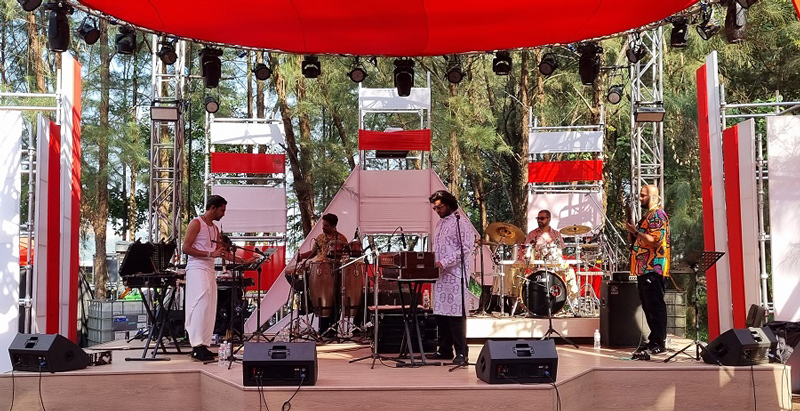(headline image: Bombay Lights)
The aptly-named Serendipity Arts Festival (SAF) is a multidisciplinary celebration of creativity held every December in Goa. The compelling lineup spans music, dance, visual arts, craft, photography, film, theater, and culinary arts.
The eight-day festival from December 15-22 is a flagship initiative of Serendipity Arts, the cultural development foundation of automotive group Hero. Founded by the group’s chairman Sunil Kant Munjal, SAF has become a prominent feature of the annual art calendar in India.
“Multi-disciplinarity is a key theme across all editions of our festival. We also closely engage with local communities,” Sunil Kant Munjal tells World Music Central, during the launch of the ninth edition of the festival.
“For example, I am just coming from a performance in Kala Academy by children from the Happy Home School for the Blind. It was a phenomenal performance – they sang continuously for a few hours, and the hall was pretty full,” he explains.
The festival has number of international partners from countries like the UK. They include Birmingham City University, British Council and Royal College of Arts. SAF will be launching international editions of its festival in the UK in 2025.
At the Azad Maidan venue, curator Helen Acharya showcased a diverse range of Indian folk and traditional music instruments. Titled Eternal Echoes: The Resonance of Heart with Heritage, the exhibition reflected the changing nature of musical instruments from desert, coastal and mountainous regions.








The live music performances are curated by Zubin Balaporia and Bickram Ghosh. The concerts are held at three venues: the Art Park, Nagalli Hills Arena, and evening boat cruises called River Raga.
The captivating sunset performances on the river cruise this week included Anupama Bhagwat (sitar) accompanied by Mayank Bedekar (tabla); and Ujjaini Mukherjee (vocals) with Anay Gadgil (keyboards).


“Everything I curated is an experiment. The combination of performances and lineups on the big stages has been experimental. There are very few acts which you may call absolutely conventional,” explains music co-curator Bickram Ghosh, himself a renowned tabla artist.



Imphal Talkies, the folk-rock band from the northeast state of Manipur, performed a range of political songs advocating for the rights of the minority communities. Meanwhile, the concert by One World brought together Indian musicians from a range of bands, including Lou Majaw, Pratika Gopinath, Warren Mendonsa, and members of Indus Creed.
With a mix of folk, Indian classical music and rock, their songs appealed for humanity’s return to unity, peace, and harmony in times of conflict, climate change, and genocide.



The rise of artificial intelligence and its impact on the creative industries featured prominently in many festival discussions and panels. “It is definitely going to impact the recording musicians, those who work primarily in the studio. But as far as live music goes, I think good performers will always have the edge,” music co-curator Zubin Balaporia explains.
“Having said that, with every new form of technology, some jobs are lost, and new ones are created. It is up to the individual to exploit this in the best way possible,” he suggests.
At the outdoor stage, Rangla Punjab performed a range of folk dance and music forms from Punjab, including bhangra, jhoomar, and luddi. Bollywood took center stage with renditions of melodies composed by the iconic duo Laxmikant-Pyarelal.

Rock fans were treated to an evening with celebrated bands Blackstratblues (powered by guitarist-composer Warren Mendonsa), and Bangalore’s Thermal And a Quarter (TAAQ).

Music of Goa and its unique influences of Portuguese colonial heritage were showcased by the bands Roz Agnon (on the changing face of Goan identity) and Sempre Fado: Antigo e Novo (with fado and Brazilian groove).


The untimely passing away of the late great tabla maestro Ustad Zakir Hussain during the week of SAF was marked by a number of dedications and tributes to the music legend. In fact, he had performed at the opening show on the 15th of December during the 2023 edition of SAF.
“This loss is a humongous personal loss to the music and cultural community,” laments Bickram Ghosh.
“Zakir Hussain could collaborate across music traditions and genres – African music, jazz, rock, pop. He had that ability to take the tabla and make it part of a global village. That was because he himself was a global citizen,” Ghosh signs off.
(All photographs were taken by Madanmohan Rao on location at SAF 2024.)


